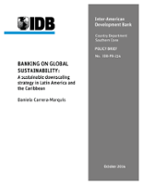Banking on Global Sustainability: A Sustainable Downscaling Strategy in Latin America and the Caribbean
Date
Sep 2014
Adequate financial markets are fundamental to sustainable development. Accurate capital allocation requires return on investment incorporates the social and environmental variables impacting, negatively or positively, such investment. Values-based capital allocation relies on sound corporate governance structures guiding the decision-making process towards sustainability objectives, not shortterm returns. One where the use of natural capital preserves the stock of capital, assuring that all generations live-off the income-flow. Concurrently financial markets, especially in emerging markets, should further engage in growth and redistribution models to create wealth for and inclusion of SMEs. Long-term financial sustainability is then aligned with environmental sustainability and social inclusion. Enhancing the potential of formal and informal SMEs requires strengthening credit channels. With the implementation of downscaling strategies, financial institutions (FIs) contribute to address existing levels of inequality while supporting the sustainable development path. At the same time FIs have the opportunity to impact the public policy dialogue regarding SMEs formalization. Formalized SMEs are in a better position to grow, to have higher labor and capital demand and productivity. For FIs this implies a market expansion. For society, higher productivity and more equitable growth contribute to a better income distribution and closing the inequality gap. Redefining the financial sector¿s role is relevant for all stakeholders. Is not a choice, is the ethical response. FIs have to acknowledge their impact on society and the environment carries greatresponsibility and that their legitimacy as agents of social change, depends on the realization that their role goes beyond the traditional financial intermediation.




